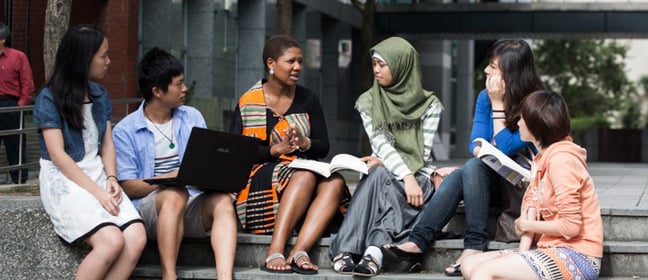Taipei Medical University

About

Taipei Medical University (TMU) is a collegiate academic institution with an extensive history in Taiwan.
Established in 1960, over the past half-century, TMU was able to grow under challenging circumstances without regular official budget from the government or funding from foundations. It underwent the processes to building the foundation, flourishing, expansion and transformation via innovation. Today, TMU has expanded into a world-class university with ten colleges, 6,000 students per year, five hospitals (TMU hospital, Wan Fang Medical Center, Shuang Ho Hospital, Taipei Cancer Center, TMU NingBo medical Center), and more than 40,000 alumni around the world, serving the society and humankind and also cultivating the future talents for the nation. These are TMU’s most concrete contributions and also its most important responsibility and mission.
In recent years, TMU has been honing its management while seeking breakthroughs and innovations. The University has experienced growth and progress in teaching, research, service, etc. and it has garnered unanimous recognition at home and abroad.
In July 2017, Global Views Monthly Magazine released the ranking for Taiwan’s Best Universities, in which TMU was ranked 9th. In particular, TMU was ranked top 1 in both faculty-student ratio section (1:9.9) and average annual budget per student section. In February 2017, Cheers Magazine published the list of the Top 20 Universities of Excellence Performance. TMU was at the 10th place in overall national ranking. Moreover, according to the Times Higher Education (THE) Asia University Ranking 2017, TMU was ranked as 91st place, for the first time. Last but not least, three months later, the QS World University Rankings released its 2018 list, and TMU was ranked 398th worldwide, being the highest-ranked private university in Taiwan. It is also ranked 10th among all Taiwan universities on the list.
TMU has been strongly promoting internationalization efforts with a total of 200 partner institutions around the world, conducting international research collaboration with US institutions such as Case Western Reserve University, Johns Hopkins University, University of Chicago, University of Texas Health Science Center at Houston, Stanford University, Yale University and US National Institutes of Health to name a few. These collaborations are part of the efforts to advance TMU’s research quality. Besides, TMU is approved by the Ministry of Education to jointly operate a “Nanomedical Engineering Graduate Institute for Masters and Ph. D. Programs” in collaboration with University of Southern California’s Vertibi School of Engineering. Also, TMU has also signed 18 dual-degree program partnerships with Case Western Reserve University and University of Southern California in the US, Universite du Droit et de la Sante Lille 2 in France, Hokkaido University in Japan, Ben-Gurion University in Israel and King Mongkut’s University of Technology Thonburi ( KMUTT ) in Thailand and others, in an effort to provide TMU students with opportunities to further their education abroad.
TMU’s vision and goal for future development includes cultivating biomedical talents that are equipped with humanistic empathy, innovative capacity and an international perspective. Also, TMU seeks to link the industry, government and academic to jointly create value and construct a comprehensive medical and nursing service system while crafting a sustainable biomedical platform and ecosystem and becoming a top-tier international university. The vision for managing the university is to develop a unified educational system that encompasses teaching, research, industry-academic and medical care. It also seeks to strengthen the strategic partnership with domestic and international institutions, enhance its translational research and cultivate interdisciplinary leadership talents.
In the future, TMU’s core of education lies in tradition and innovation. The strong foundations that TMU has established in internationalization of teaching and research, information management, translational research on cancer, and medical humanities will be passed down. Areas for innovation include interdisciplinary education, biotechnology entrepreneurship, neurology and caring industry.
In terms of development strategy, TMU would construct an interdisciplinary research team by integrating the areas of translational research on cancer, research and development of new drugs, cell therapy, precision medicine, and AI medicine. The project of Shuang Ho Biotech Park will be developed in full swing to forge TMU as an important community of the biotech industry. Besides, enhancing international competitiveness, cultivating students’ international mobility, and strengthening international research cooperation in research projects are vital tasks for TMU to join the academic community worldwide.
As for the field of medicine, TMU will soon establish a University-level Comprehensive Neurological Center and keep on upgrading Taipei Cancer Center to a world-class research facility, so that these two fields of research will become TMU’s key features. Other crucial efforts include transforming TMU’s hospitals into smart ones and establishing an integrated medical care system, thus making some contribution to the aging society of Taiwan.
In the years ahead, TMU will work towards becoming a happy enterprise, where the professors and staff can enjoy work and develop their expertise while also providing students with a free and energetic campus atmosphere to realize their dreams. TMU also strives to be an institution where the alumni community can be proud of the alma mater, jointly give back to the University, create TMU’s new blueprint and complete TMU’s new vision of “Joy, Hope and Happiness.”
Courses46 Courses
Learn new skills, pursue your interests or advance your career with our short online courses.